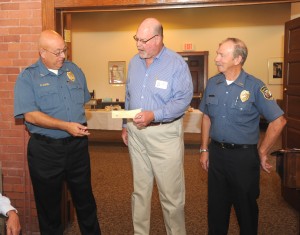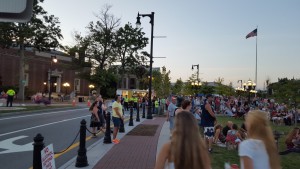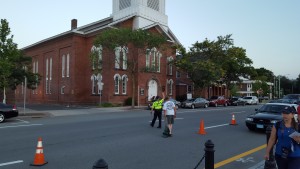WESTFIELD—For officers in the Westfield Auxiliary Police Department, the only compensation they receive is pride in serving their community—but that’s all many of them want.
The Westfield Auxiliary Police, a 30-personnel group that serves under the Westfield Police Department, is an all-volunteer department for the city of Westfield. Their existence and hundreds of hours worked each year save the department tens of thousands of dollars a year and provides the city with an additional layer of service and protection that may not be available during busier times.
“We provide a high level of service for the citizens of Westfield and it isn’t possible without them,” Westfield Police Chief John Camerota said.
The auxiliary police, who Camerota said have the full spectrum of police powers when called to duty, help the city by providing volunteer policing for events, traffic details and even patrol.
“Concerts, road races, any large scale function, the Westfield Fair, Westfield Taste—the fireworks is probably our biggest event of the year” director of the auxiliary police, Robert Sorel, said.
“We do everything from crowd control to traffic to maintaining intersections,” he said. “And we augment patrol Thursday through Sunday.”
Camerota said “from July to present, if we use the lowest patrol rate, they saved us just under $40,000.”
For comparison, that would be enough to fund a new police patrolman, based on salaries from the online database.
Sorel reported that the officers log an average of 3,000 hours a year, and have worked a total of 2,200 hours so far in 2017.
Each auxiliary officer is mandated to provide at least 100 hours of service a year, which Sorel said many exceed. He said that some officers manage to volunteer for as many as 400 hours a year, which breaks down to almost eight hours a week—and this is in addition to their full-time jobs and time devoted to families or other activities.
Sorel said that these auxiliary officers are not compensated monetarily, except for in a few instances, but his officers generally do not take it.
“We get the road details after regular officers and then retirees, but less than half of our officers take advantage of that,” he said. Road details are assignments such as traffic control around construction zones, and are compensated at the standard rate that full-time officers are paid at.
And even when it comes to training, the auxiliary officers do not receive reimbursement.
“We are subject to same rules and regulations,” Sorel said. “We are trained along with the reserves and we must pass the academy prior to working for the department.”
Sorel said that the training costs officers around $1,800, including supplies such as books, and takes six months to complete. After the academy, the officers then must go through the department’s training, which can take up to an additional six months. Also, officers must provide their own handgun and purchase their own uniforms. The only item that Westfield Police provide is leather gear holsters.
Also, the department does not have a budget, Sorel said. Instead, they survive on donations made from people and companies.
Sorel said that the reason he does this volunteer work is because he wants to give back to the community.
“Giving back to the city is the least I can do, and I enjoy it too,” Sorel said.

Robert Sorel, director of the city’s auxiliary police force, accepts a $500 contribution from Mark Boardman, chair of the Westfield Rotary club’s fireworks committee, in appreciation of the assistance provided by auxiliary officers at the Independence Day fireworks display in the city. Looking on is Auxiliary Lt. Don Humason Sr. (Photo courtesy The Rotary Club of Westfield)
This same sentiment is what drives a lot of the rest of the force, Sorel added. However, for some there is more to gain than just community involvement.
“I’m going to say a good third to a half of the officers we have are looking for a career in law enforcement,” he said.
“It’s a great place to find out if you like it, if you’re cut out to be an officer, and it gives you a great place to work with other officers,” Sorel said. “And if you come up on the list for civil service you already have a lot of training that will save a department a lot of money and can hit the street that much quicker.”
As an example, recently former auxiliary officer Patrick Harper was hired by Northborough Police Department as a full-time officer. It was reported by Westfield Police Capt. Michael McCabe that the Northborough Police Chief extended a personal thank you to Westfield for Harper’s preparedness.
But for Sorel, it isn’t about a career or experience.
“It’s just something I enjoy doing, giving back to the community, giving us a safe place to live.”




